人教必修3 Unit 4 Astronomy: the science of the stars Using language(共28张PPT)
文档属性
| 名称 | 人教必修3 Unit 4 Astronomy: the science of the stars Using language(共28张PPT) |
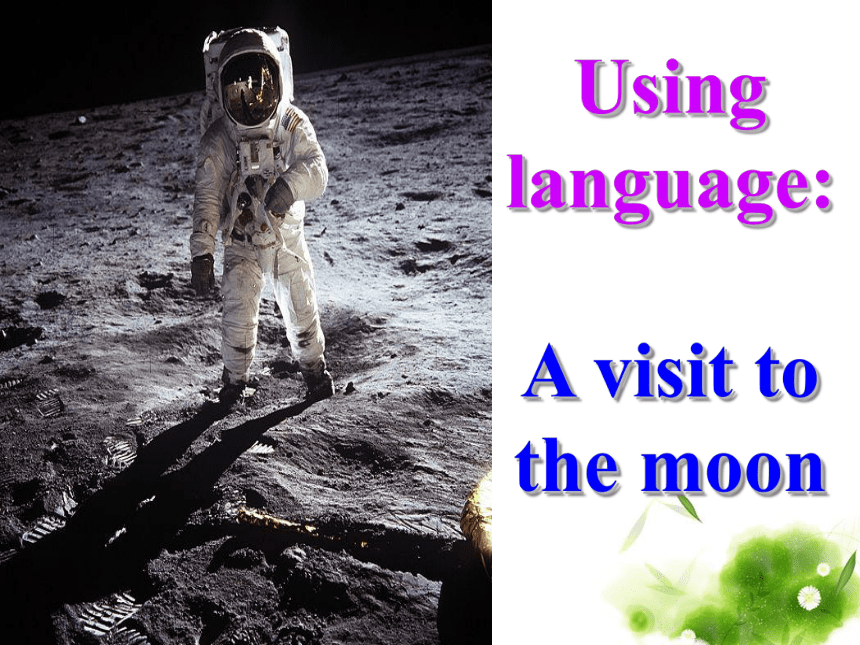
|
|
| 格式 | zip | ||
| 文件大小 | 1.8MB | ||
| 资源类型 | 教案 | ||
| 版本资源 | 人教版(新课程标准) | ||
| 科目 | 英语 | ||
| 更新时间 | 2020-03-13 10:58:45 | ||
图片预览

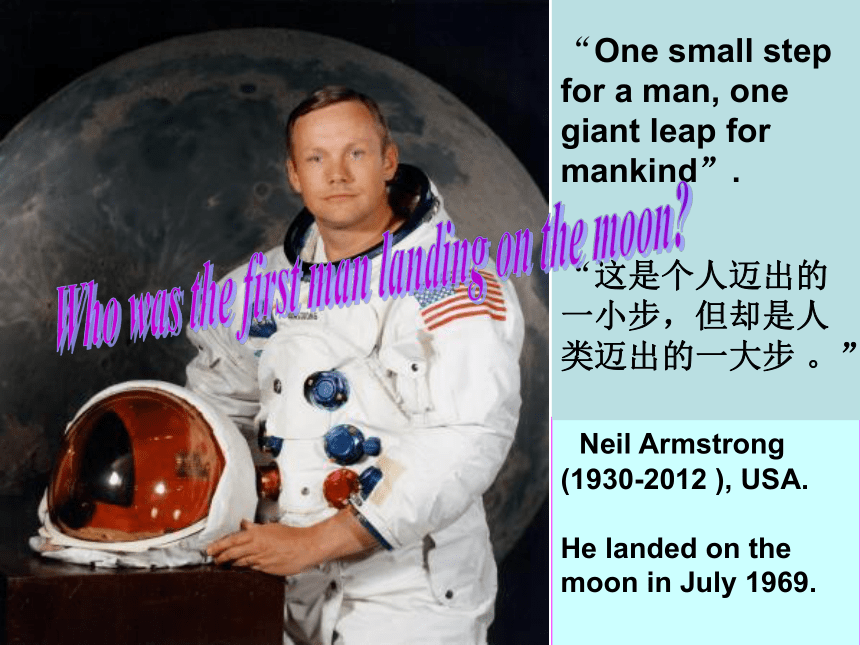
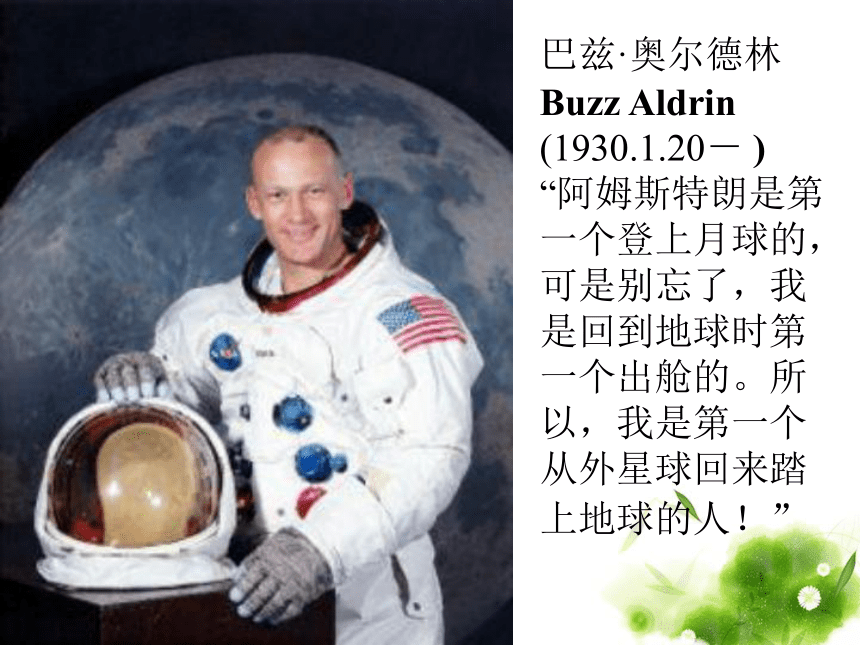
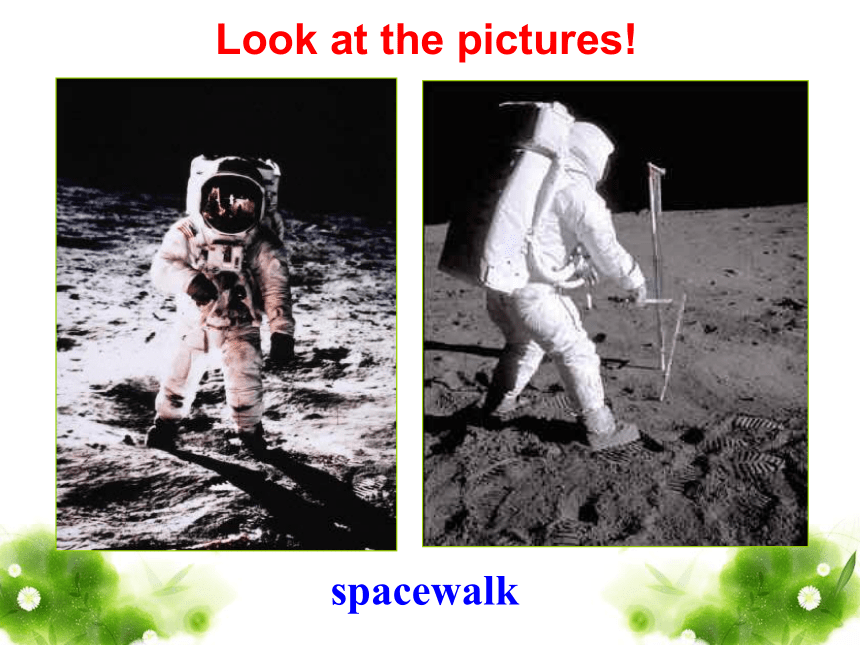
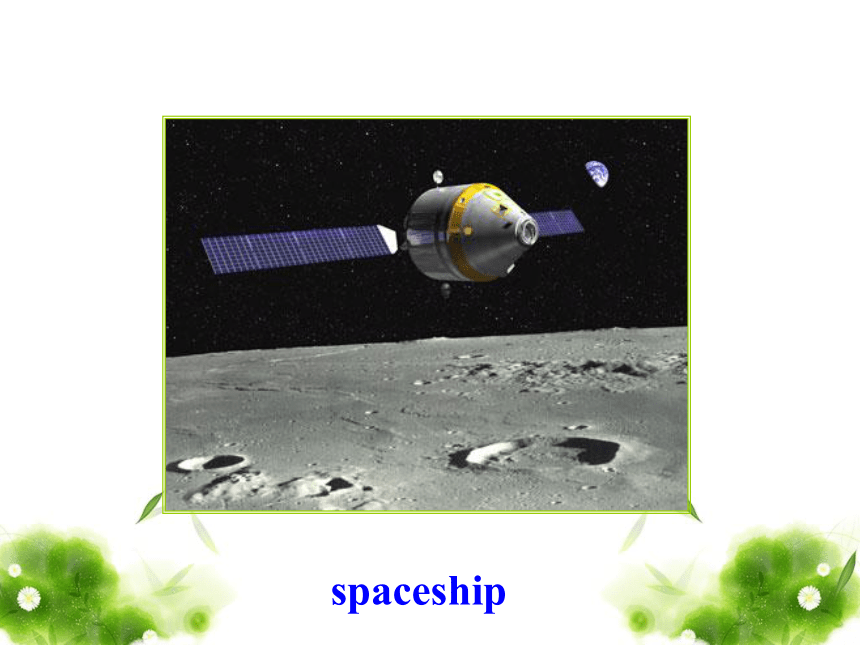
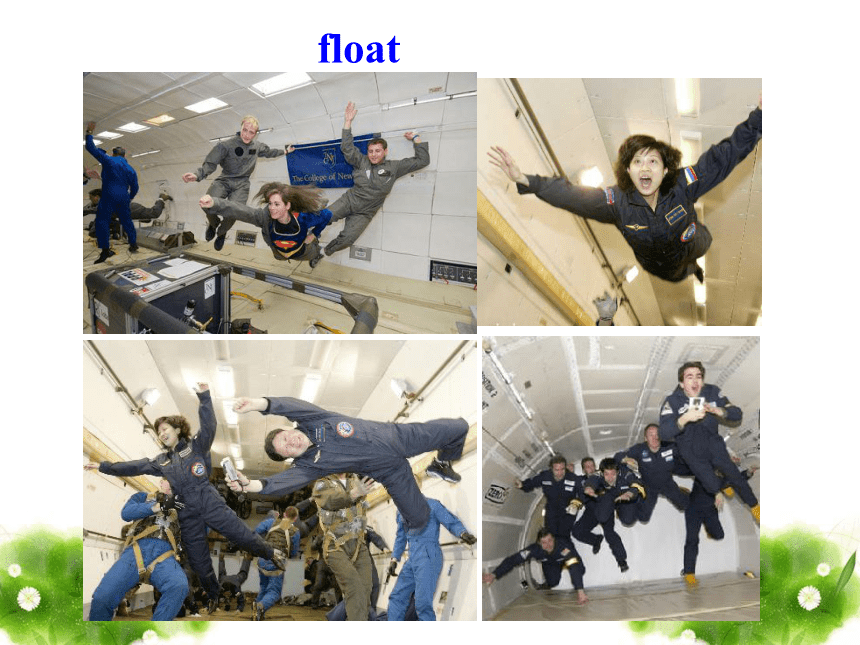
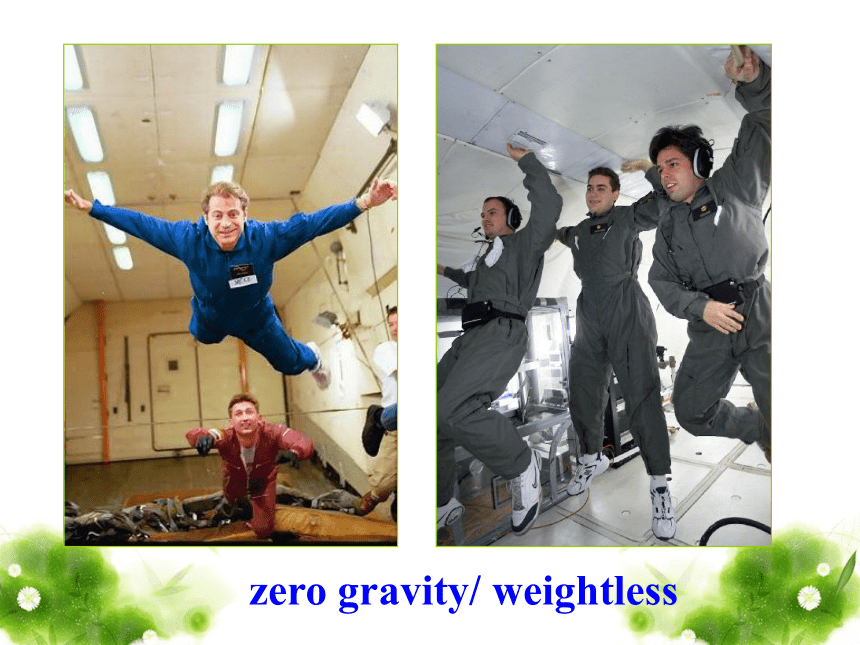
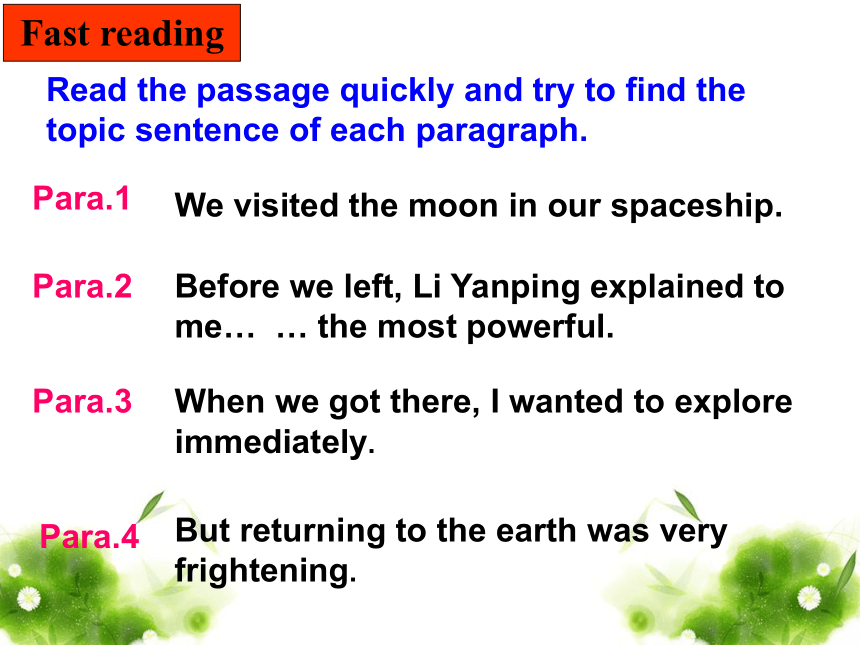
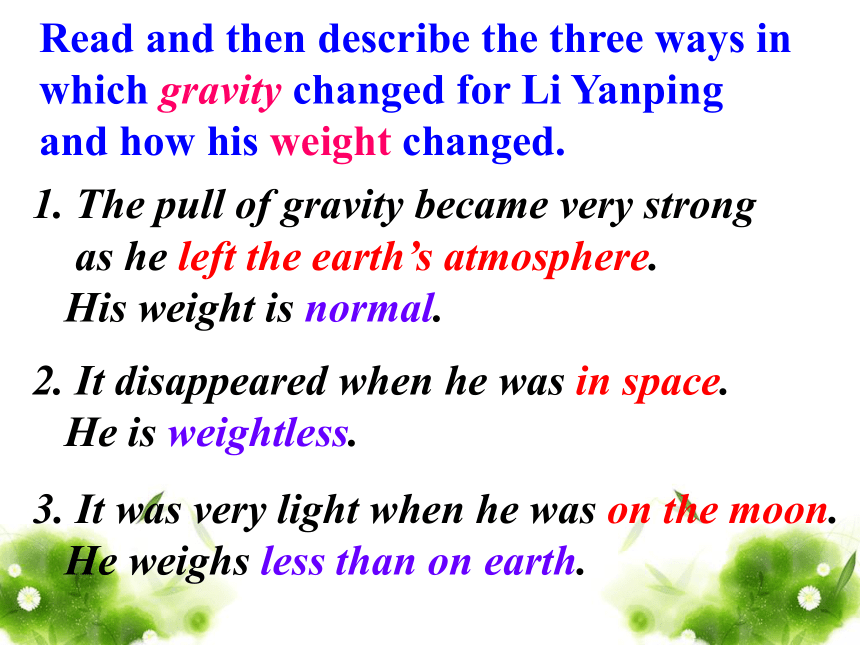
文档简介
(共28张PPT)
Using language:
A visit to the moon
“One small step for a man, one giant leap for mankind”.
Neil Armstrong (1930-2012 ), USA.
He landed on the moon in July 1969.
“这是个人迈出的一小步,但却是人类迈出的一大步 。”
巴兹·奥尔德林 Buzz Aldrin
(1930.1.20- )
“阿姆斯特朗是第一个登上月球的,可是别忘了,我是回到地球时第一个出舱的。所以,我是第一个从外星球回来踏上地球的人!”
spacewalk
Look at the pictures!
spaceship
float
zero gravity/ weightless
We visited the moon in our spaceship.
Para.2
Before we left, Li Yanping explained to me… … the most powerful.
Para.1
But returning to the earth was very frightening.
Para.4
When we got there, I wanted to explore immediately.
Para.3
Fast reading
Read the passage quickly and try to find the topic sentence of each paragraph.
Read and then describe the three ways in which gravity changed for Li Yanping and how his weight changed.
1. The pull of gravity became very strong
as he left the earth’s atmosphere.
His weight is normal.
2. It disappeared when he was in space.
He is weightless.
3. It was very light when he was on the moon.
He weighs less than on earth.
If you were going to the moon, what things would you need? Why?
things needed
on the moon
oxygen tanks
space food
spacesuit
water
Step3
spaceship
qualities of
an astronaut
good health
right height and weight
many years’ training
calmness
Step4
patience
If you were going to the moon, what qualities should you have to overcome the difficulties and have a happy visit?
Language points
1. but it will not be as strong a pull as the earth’s.
as +adj (+a +可数名词单数)+as
as +adj+(不可数名词或可数名词复数)+as
和...一样
He asked me as difficult a question as yours.
= He asked me a question as difficult as yours.
I have as many friends as he.
2. I cheered up immediately and floated weightlessly around in our spaceship cabin watching the earth become smaller and the moon larger.
watching 现在分词短语作伴随状语,表示主动关系。
the earth become smaller and the moon larger 属于省略
(1) 并列句中的省略
Your advice made me happy but (your advice made) our boss angry .
(2) 状语从句中的省略
Work hard when (you are) young, or you’ll regret.
(3) 定语从句中的省略
Is he the boy (that / who / whom) you were talking about last night?
(4) 宾语从句中的省略
I know that Yao Ming will come to our city but I don’t know when (he will come to our city).
(5) 简单句中的省略—祈使句
(You) Open the door,please. 请开门。
cheer v.
【用法1】vi. 欢呼;喝彩
All of us were cheering when (we were) watching the party.
【用法2】vt. 使高兴;使鼓舞;为……欢呼/喝彩
His words cheered me a lot when I was lost.
【用法3】cheer up (使)高兴起来;(使)感到振奋
Flowers always cheer a room up.
我们现在要做的是使他振作起来。
What we should do now is to cheer him up.
cheer n.
He can always get cheers when he is singing.
We should fill ourselves with cheer in daily life.
① The movie star warmly as he got on the stage.
② What can I do to her ?
③ During the Spring Festival you can hear the
of children everywhere.
was
cheered
cheer
up
cheers
欢呼,喝彩
愉快的情绪
④ 有困难时可以找你的老师帮忙。(使用省略)
⑤ 我知道去哪里但不知道什么时候。(使用省略)
⑥ 我很晚都没睡,希望看到圆圆的月亮。(使用分词短语作状语)
You can turn to your teacher when in trouble.
I know where to go but I don’t know when.
I stayed awake late, hoping to catch sight of the round moon.
1). “A + be + 倍数 + as +形容词原级 + as + B”.
My room is three times as big as yours.
2). “A + be + 倍数 +形容词比较级 + than + B ”
My room is twice bigger than yours.
3). “A + be + 倍数 + the +名词 (size, length, amount) + of + B”
My room is three times the size of yours.
3. But when I tried to step forward, I found I was carried twice as far as on the earth and fell over.
4. ... “walking does need a bit of practice now that gravity has changed.
now that同since相似,语气较弱,强调人们已知的事实。后跟句子。
1. 既然你有机会,就应该充分利用它。
Now that you've got a chance, you should make full use of it.
辨析 now that, since, because, as, for和because of
now that=since,常译为“既然,鉴于”,强调人们已知的事实,表示关系上的自然的结果;一般位于主句前。
because表示直接的原因,常用于对why的回答。其从句一般位于主句后。
for主要用于书面语,表示推断的间接的原因,或对前一分句补充说明理由,一般不放在句首。
as引导原因状语从句时语气比because弱,只说明一般的因果关系;其从句一般放在主句前。
because of意为“由于,因为”,是介词短语,后面接名词或动名词。
【即讲即练】——翻译句子
① 既然你不太舒服,你就留在家里吧。
② 因为他喝醉了所以他认不出回家的路。
③ 这些书应该是给小孩看的,因为里面有好多卡通画。
④ 我妈妈是音乐教师,所以我很小就开始弹钢琴。
Now that you are not feeling well, you may stay at home.
He couldn’t remember the way home because he was drunk.
These books should be intended for children, for there are many cartoon pictures in them.
As my mother is a music teacher, I began to play the piano at an early age.
5. We watched, amazed as fire broke
out on the outside of the spaceship as
the earth’s gravity increased.
break out
它与happen, take place, come out等词的用法一样,是不及物动词,不能带宾语,不能用于被动语态。
辨析 break out, take place, happen, occur
break out 意为“发生、爆发”,常指战争、灾难、疾病或者争吵等事件的发生。
take place 意思是“发生、举行、举办”,一般指事情按预先的安排发生或事情发生有某种原因
happen 意为“发生、碰巧”,一般用于偶然或突发性事件。
sth happen to sb 某人发生某事
sb happen to do sth 某人碰巧做某事
occur 强调呈现于人的知觉、心、脑。常用“It occurs / occurred to sb...”表示“某人忽然想起……”。
It occurred to me that we have to do the work of Friday today.
break down
身体崩溃,机器坏了,谈判破裂
break in break up
插话= cut in 打碎,破裂,分手
break through break off
突破 忽然停止,结束
break away from
脱离,与…断绝来往, 改变某种习惯
① I was late because my car on the way there.
② The next Olympics will in 2012 in London.
③ When the Second World War , Anne’s family had to hide only because they were Jews.
④ In fact he did not want to
her, for he still loved her.
⑤ It to me that Joe might be able to work out the problem for us.
broke out
break away from
/ break up with
occurred
take place
broke down
6 watch out 密切注意,当心,提防
We are asked to watch out for the small mistakes in exams.
【拓展1】近义短语
look out 小心;留神 be careful 小心
【拓展2】与out相关的短语
hang out 挂出;闲逛 run out 用完
come out 出来;出版 point out指出
carry out 执行;完成
figure out 解决;算出;想出 pick out 挑选;辨认出
work out 解决;制定出 find out 找出;查明
set out 出发 put out 扑灭;出版
【即讲即练】——用上面单词或短语的正确形式填空
① You can your new bicycle now.
② Everybody , the bus is taking a sharp turning.
③ All his money has .
④ In school we never give a child a chance to
his mistakes for himself.
⑤ He is trying to his tax.
⑥ My English teacher that we must keep taking exercise every day.
pointed out
pick out
watches out
run out
find out
figure out
Using language:
A visit to the moon
“One small step for a man, one giant leap for mankind”.
Neil Armstrong (1930-2012 ), USA.
He landed on the moon in July 1969.
“这是个人迈出的一小步,但却是人类迈出的一大步 。”
巴兹·奥尔德林 Buzz Aldrin
(1930.1.20- )
“阿姆斯特朗是第一个登上月球的,可是别忘了,我是回到地球时第一个出舱的。所以,我是第一个从外星球回来踏上地球的人!”
spacewalk
Look at the pictures!
spaceship
float
zero gravity/ weightless
We visited the moon in our spaceship.
Para.2
Before we left, Li Yanping explained to me… … the most powerful.
Para.1
But returning to the earth was very frightening.
Para.4
When we got there, I wanted to explore immediately.
Para.3
Fast reading
Read the passage quickly and try to find the topic sentence of each paragraph.
Read and then describe the three ways in which gravity changed for Li Yanping and how his weight changed.
1. The pull of gravity became very strong
as he left the earth’s atmosphere.
His weight is normal.
2. It disappeared when he was in space.
He is weightless.
3. It was very light when he was on the moon.
He weighs less than on earth.
If you were going to the moon, what things would you need? Why?
things needed
on the moon
oxygen tanks
space food
spacesuit
water
Step3
spaceship
qualities of
an astronaut
good health
right height and weight
many years’ training
calmness
Step4
patience
If you were going to the moon, what qualities should you have to overcome the difficulties and have a happy visit?
Language points
1. but it will not be as strong a pull as the earth’s.
as +adj (+a +可数名词单数)+as
as +adj+(不可数名词或可数名词复数)+as
和...一样
He asked me as difficult a question as yours.
= He asked me a question as difficult as yours.
I have as many friends as he.
2. I cheered up immediately and floated weightlessly around in our spaceship cabin watching the earth become smaller and the moon larger.
watching 现在分词短语作伴随状语,表示主动关系。
the earth become smaller and the moon larger 属于省略
(1) 并列句中的省略
Your advice made me happy but (your advice made) our boss angry .
(2) 状语从句中的省略
Work hard when (you are) young, or you’ll regret.
(3) 定语从句中的省略
Is he the boy (that / who / whom) you were talking about last night?
(4) 宾语从句中的省略
I know that Yao Ming will come to our city but I don’t know when (he will come to our city).
(5) 简单句中的省略—祈使句
(You) Open the door,please. 请开门。
cheer v.
【用法1】vi. 欢呼;喝彩
All of us were cheering when (we were) watching the party.
【用法2】vt. 使高兴;使鼓舞;为……欢呼/喝彩
His words cheered me a lot when I was lost.
【用法3】cheer up (使)高兴起来;(使)感到振奋
Flowers always cheer a room up.
我们现在要做的是使他振作起来。
What we should do now is to cheer him up.
cheer n.
He can always get cheers when he is singing.
We should fill ourselves with cheer in daily life.
① The movie star warmly as he got on the stage.
② What can I do to her ?
③ During the Spring Festival you can hear the
of children everywhere.
was
cheered
cheer
up
cheers
欢呼,喝彩
愉快的情绪
④ 有困难时可以找你的老师帮忙。(使用省略)
⑤ 我知道去哪里但不知道什么时候。(使用省略)
⑥ 我很晚都没睡,希望看到圆圆的月亮。(使用分词短语作状语)
You can turn to your teacher when in trouble.
I know where to go but I don’t know when.
I stayed awake late, hoping to catch sight of the round moon.
1). “A + be + 倍数 + as +形容词原级 + as + B”.
My room is three times as big as yours.
2). “A + be + 倍数 +形容词比较级 + than + B ”
My room is twice bigger than yours.
3). “A + be + 倍数 + the +名词 (size, length, amount) + of + B”
My room is three times the size of yours.
3. But when I tried to step forward, I found I was carried twice as far as on the earth and fell over.
4. ... “walking does need a bit of practice now that gravity has changed.
now that同since相似,语气较弱,强调人们已知的事实。后跟句子。
1. 既然你有机会,就应该充分利用它。
Now that you've got a chance, you should make full use of it.
辨析 now that, since, because, as, for和because of
now that=since,常译为“既然,鉴于”,强调人们已知的事实,表示关系上的自然的结果;一般位于主句前。
because表示直接的原因,常用于对why的回答。其从句一般位于主句后。
for主要用于书面语,表示推断的间接的原因,或对前一分句补充说明理由,一般不放在句首。
as引导原因状语从句时语气比because弱,只说明一般的因果关系;其从句一般放在主句前。
because of意为“由于,因为”,是介词短语,后面接名词或动名词。
【即讲即练】——翻译句子
① 既然你不太舒服,你就留在家里吧。
② 因为他喝醉了所以他认不出回家的路。
③ 这些书应该是给小孩看的,因为里面有好多卡通画。
④ 我妈妈是音乐教师,所以我很小就开始弹钢琴。
Now that you are not feeling well, you may stay at home.
He couldn’t remember the way home because he was drunk.
These books should be intended for children, for there are many cartoon pictures in them.
As my mother is a music teacher, I began to play the piano at an early age.
5. We watched, amazed as fire broke
out on the outside of the spaceship as
the earth’s gravity increased.
break out
它与happen, take place, come out等词的用法一样,是不及物动词,不能带宾语,不能用于被动语态。
辨析 break out, take place, happen, occur
break out 意为“发生、爆发”,常指战争、灾难、疾病或者争吵等事件的发生。
take place 意思是“发生、举行、举办”,一般指事情按预先的安排发生或事情发生有某种原因
happen 意为“发生、碰巧”,一般用于偶然或突发性事件。
sth happen to sb 某人发生某事
sb happen to do sth 某人碰巧做某事
occur 强调呈现于人的知觉、心、脑。常用“It occurs / occurred to sb...”表示“某人忽然想起……”。
It occurred to me that we have to do the work of Friday today.
break down
身体崩溃,机器坏了,谈判破裂
break in break up
插话= cut in 打碎,破裂,分手
break through break off
突破 忽然停止,结束
break away from
脱离,与…断绝来往, 改变某种习惯
① I was late because my car on the way there.
② The next Olympics will in 2012 in London.
③ When the Second World War , Anne’s family had to hide only because they were Jews.
④ In fact he did not want to
her, for he still loved her.
⑤ It to me that Joe might be able to work out the problem for us.
broke out
break away from
/ break up with
occurred
take place
broke down
6 watch out 密切注意,当心,提防
We are asked to watch out for the small mistakes in exams.
【拓展1】近义短语
look out 小心;留神 be careful 小心
【拓展2】与out相关的短语
hang out 挂出;闲逛 run out 用完
come out 出来;出版 point out指出
carry out 执行;完成
figure out 解决;算出;想出 pick out 挑选;辨认出
work out 解决;制定出 find out 找出;查明
set out 出发 put out 扑灭;出版
【即讲即练】——用上面单词或短语的正确形式填空
① You can your new bicycle now.
② Everybody , the bus is taking a sharp turning.
③ All his money has .
④ In school we never give a child a chance to
his mistakes for himself.
⑤ He is trying to his tax.
⑥ My English teacher that we must keep taking exercise every day.
pointed out
pick out
watches out
run out
find out
figure out
同课章节目录
